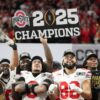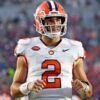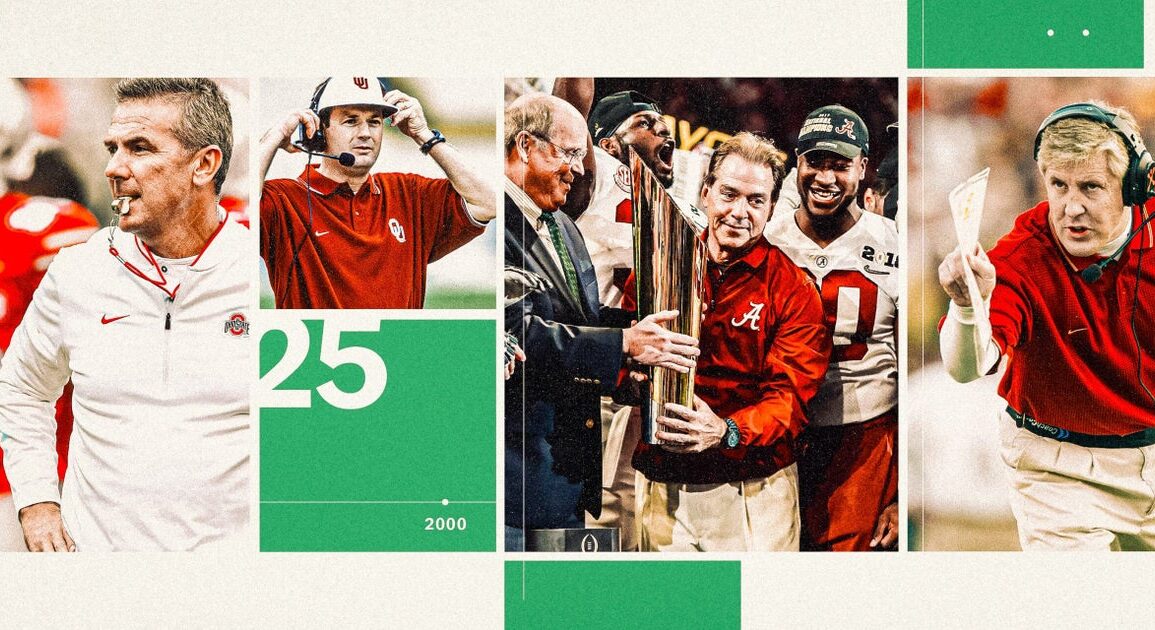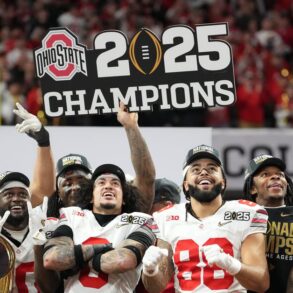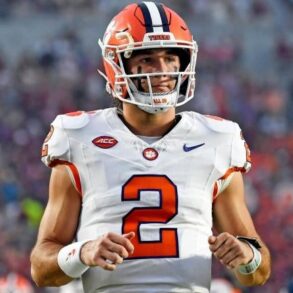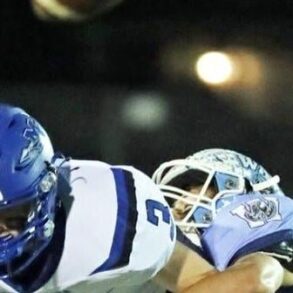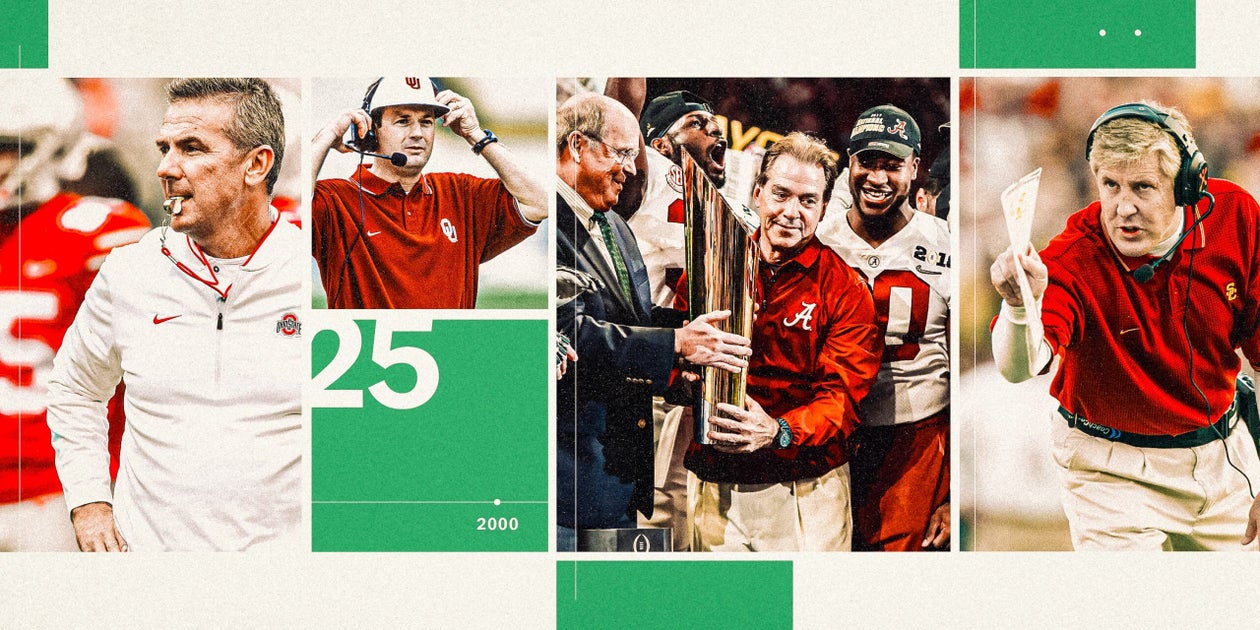
Editor’s note: All week, The Athletic is looking back at the best of the first 25 years of the 2000s in college football. Read the top 25 teams and top 25 players and check back for the best games and programs.
College football has long been defined by its coaches. In a sport where players come and go quickly, the coaches are consistent.
Advertisement
The first 25 years of the 2000s have been an era of transition. Some of the winningest coaches in history left the sport early in the quarter-century. A new crop has stepped into the spotlight. So, who have been the best coaches of the 2000s thus far?
The ranking below only takes into account what coaches have accomplished in the 2000s, and it only counts their FBS head coaching success, not what they may have done in the NFL or lower levels of college football. It also only counts work as a head coach, not an assistant. Does longevity help? As long as the success continued. You’ll notice some coaches got out before their peak years were about to turn south, while others stuck around too long and finished on a bad note.
Championships matter a lot. It helps if you took over a bad situation and made it better, rather than inheriting a good situation and continuing the success. For active coaches, this is not a grade of where they stand among their 2025 peers. It’s not about trajectory or putting weight on more recent accomplishments. It’s only about the total resume over 25 years.
As you’ll see, the hardest part was determining who didn’t make the cut. I wish this was a top 30, but it’s not 2030. Let’s get into it:
25. Mike Leach (Texas Tech, Washington State, Mississippi State)
Accomplishments: Seven AP Top 25 finishes, two 11-win seasons, seven seasons with at least nine wins
The numbers don’t tell the full story for Leach, who only coached at schools where it’s difficult to win and left all three programs much better than he found them. The 2008 Texas Tech team missed out on the Big 12 championship, and likely a Bowl Championship Series game, due to a BCS ranking tiebreaker. The Air Raid offense Leach learned from Hal Mumme completely reshaped the way football offenses work. Everyone in the Big 12 copied him in the 2000s. He died one win short of the winning percentage threshold to be eligible for the College Football Hall of Fame, but those involved believe it’s likely he gets in once he can be discussed as a candidate, three years after his final game in 2022.
Advertisement
24. Chip Kelly (Oregon, UCLA)
Accomplishments: Three Pac-12 championships, three top-five finishes, one BCS championship game appearance, four BCS bowl appearances
Kelly is really difficult to place. A 46-7 record at Oregon with three top-four finishes and a BCS title game appearance before going to the NFL is an elite run, and his up-tempo offense changed the sport. But he had as many winning seasons as losing seasons at UCLA (three) and jumped to Ohio State last year to be an assistant, meaning 60 percent of his college head coaching career came with the Bruins, where he had one top-25 finish.
23. Bill Snyder (Kansas State)
Accomplishments: Two Big 12 championships, two Fiesta Bowl appearances, five top-15 finishes, four 11-win seasons
I have to start by again noting that these rankings do not factor in success in the 1990s, which removes from consideration that Snyder’s K-State teams twice nearly reached the national title game in that decade. But after the peak of one of the most amazing program turnarounds in college football history, Snyder’s 2000s record was still very strong, with two Big 12 titles/Fiesta Bowls and two other top-10 finishes. To come out of retirement in 2009 and show this job could still be a winner was a remarkable achievement. But Snyder posted just one Top 25 finish in his last six seasons, and his Wildcats had six seasons with six or fewer wins after 2000.
22. Kirk Ferentz (Iowa)
Accomplishments: Two Big Ten championships, five top-10 finishes, three BCS/NY6 appearances, eight double-digit-win seasons
Ferentz will pass Woody Hayes as the winningest coach in Big Ten history with two more victories. His consistency is underrated, reaching bowl eligibility in 23 of the last 24 seasons with five top-10 finishes. The Hawkeyes have had five Top 25 finishes in the last seven seasons but no top-10 finishes since 2015.
Advertisement
21. Mark Dantonio (Cincinnati, Michigan State)
Accomplishments: Three Big Ten championships, one CFP appearance, two BCS wins, six top-15 finishes, six double-digit-win seasons
Dantonio took over a floundering MSU program in 2007 and turned it into one of the Big Ten’s best. He won the school’s first Big Ten title in more than two decades. The 2013 team that won the Rose Bowl might have won a national championship if the CFP had existed. Dantonio also won four consecutive games against Michigan, the first time the Spartans had done that since the early 1960s. But like several other coaches on this list, the final few years were below the standard he set, with one Top 25 finish in his last four seasons, including a 3-9 record on the heels of the CFP appearance. The consistency was similar to Ferentz, but the highs were higher, including a win over Ferentz in the 2015 Big Ten title game.
20. Lincoln Riley (Oklahoma, USC)
Accomplishments: Four Big 12 championships, three CFP appearances, six top-15 finishes, five double-digit win seasons, three Heisman winners
This is where the quality of the job a coach inherited comes into play. Riley took over a top-five, 11-win Oklahoma program and went to three consecutive CFPs. On the other hand, he was one Pac-12 championship game loss to Utah away from another CFP appearance at USC in his first year after taking over a 4-8 program. Remarkably, he’s still just 41. But Oklahoma had started to take a step back before he left for L.A., and the Trojans’ record has gotten worse each year since his debut season, preventing him from landing higher.
19. Kyle Whittingham (Utah)
Accomplishments: One undefeated season, three conference championships, two top-10 finishes, seven double-digit-win seasons, three BCS/NY6 appearances
Whittingham took over for Urban Meyer after the Utes’ undefeated 2004 season and produced his own undefeated year in 2008, beating Nick Saban’s Alabama in the Sugar Bowl. He got the Utes from the Mountain West into the Pac-12 and then the Big 12. The 2019 Utah team looked poised to reach the CFP but was upset by Oregon in the Pac-12 title game. Utah returned the favor, knocking USC out of the CFP picture in 2021, the start of consecutive Pac-12 championships and Rose Bowl appearances.
18. Mark Richt (Georgia, Miami)
Accomplishments: Two SEC championships, eight top-10 finishes, four BCS/NY6 appearances
Advertisement
Richt took over a Georgia program known for failing to meet its potential and raised the bar, posting five top-10 finishes in his first seven seasons. The 2007 team finished ranked No. 2, and the 2012 team was mere yards away from winning the SEC and going to the national championship game. Richt was fired after a 9-3 season in 2015, one year removed from a top-10 finish. He returned to his alma mater at Miami (Fla.) and had two top-20 finishes in three seasons, reaching No. 2 at one point in 2017. Over 18 years, he never missed a bowl game. The only thing holding Richt’s resume back was never winning the Big One.
17. Les Miles (Oklahoma State, LSU)
Accomplishments: One national championship, two BCS title game appearances, two SEC championships, four top-five finishes
Miles produced three consecutive winning seasons at Oklahoma State after the Cowboys had just one in the previous 12. He then took over LSU in 2005, two years after Saban won a national title, and won his own in 2007. Miles also built the program back up to take the 2011 team on an undefeated run to the national championship game, where he lost to an Alabama team that LSU had already beaten. But he never again produced a top-10 team, and after getting fired early in the 2016 season, Miles went 3-18 in less than two seasons at Kansas, and he was fired amid an 0-9 start while facing allegations of inappropriate behavior toward female students from his time at LSU. He’s outside the top 15 despite winning a national title and reaching another, but he’s also the only coach on this list with a winless year on his resume.
16. James Franklin (Vanderbilt, Penn State)
Accomplishments: One Big Ten championship, one CFP appearance, CFP first round and quarterfinal wins, five top-10 finishes, five NY6 appearances, two Top 25 finishes at Vanderbilt
Franklin has been a consistent winner, reaching a bowl game in all 14 non-COVID-19-altered seasons he’s spent as a head coach, with six double-digit-win seasons at Penn State. Given more opportunity in a 12-team CFP, Penn State won two games and nearly won a semifinal. He also took Vanderbilt to its only Top 25 finishes since 1949. The only real criticism of Franklin’s run is that he hasn’t won big enough, unable to get over the final hump. It’s a similar resume to Richt at Georgia, but the Vanderbilt success puts Franklin higher.
15. Gary Patterson (TCU)
Accomplishments: One undefeated season, six conference championships, seven top-10 finishes, three BCS/NY6 appearances (two wins)
Patterson took over a 10-win program from Dennis Franchione in 2001 and left with a statue on campus. The Horned Frogs had four consecutive top-15 finishes with at least 11 wins from 2008 to ’11, including an undefeated year and Rose Bowl win in 2010. They won the Big 12 in their third season as a league member in 2014, controversially missing out on the first CFP. But Patterson’s run ended with four below-average seasons from 2018 to ’21 and he was fired amid a 3-5 season, with one Top 25 finish in his last six years.
Advertisement
14. Frank Beamer (Virginia Tech)
Accomplishments: Four ACC championships, five top-10 finishes, 10 double-digit-win seasons (eight consecutive), five BCS appearances
This window does not include Virginia Tech’s appearance in the national championship game at the end of the 1999 season, but Beamer still won big in the first half of the next decade, regularly reaching the ACC championship game and finishing in the top 15. In hindsight, his run of eight straight seasons with at least 10 wins from 2004 to 2011 still doesn’t get enough respect, but that stretch included no top-five finishes, and his career ended with four average seasons from 2012 to ’15 and no Top 25 finishes among them.
13. Jimbo Fisher (Florida State, Texas A&M)
Accomplishments: One BCS national championship, three ACC championships, five top-10 finishes, one CFP appearance, four BCS/NY6 appearances, 29-game winning streak
Fisher took over for a slumping Bobby Bowden in 2010 and brought FSU back to the top, with a national title in 2013 and a CFP appearance the following year after an undefeated regular season, reaching 29 consecutive wins. But he never got back to that level and left FSU for Texas A&M amid a 5-6 season. Fisher arrived in College Station with public national championship expectations. He produced a top-five finish in the pandemic-shortened 2020 season but went 5-7 two years later and was fired in 2023 with a record $76 million buyout, having posted two Top 25 finishes in six years in College Station. His resume is similar to Miles’, and the national title helps a lot, but Fisher didn’t have the same levels of lows or off-field conduct problems.
12. Brian Kelly (Central Michigan, Cincinnati, Notre Dame, LSU)
Accomplishments: One BCS title game appearance, two CFP appearances, three BCS game appearances, four top-five finishes, 12 double-digit-win seasons in FBS
Kelly has been a head coach every year since 1991 and has just two losing seasons in his entire career (Central Michigan in 2004, Notre Dame in 2016). That’s incredible consistency when considering the number of job changes on his path from Division II Grand Valley State to LSU. The only thing missing from his resume is an FBS national title; he’s had undefeated teams stifled by Nick Saban (2012) and Dabo Swinney (2018). This ranking doesn’t include Kelly’s two Division II national titles, but he had seven consecutive top-15 seasons until this past year, which was still a nine-win season. The ability to transition and keep winning boosts Kelly’s case when compared to someone like Fisher or the coaches who tailed off at the end.
11. Ryan Day (Ohio State)
Accomplishments: One national championship, three Big Ten championships, four CFP appearances, two national championship appearances, 70-10 record, six top-10 finishes in six seasons
Advertisement
It’s still fascinating to look back and think Day was on the hot seat, at least in the eyes of some observers and fans, before the run to the 2024 national championship. Day had taken the Buckeyes to the championship game following the 2020 season, and they were a last-second missed field goal away from reaching the 2022 title game. It’s just that dang Michigan game. Day is 49-5 against Big Ten opponents, but four of those losses have come to the Wolverines. His 87.5 winning percentage in Columbus is higher than Urban Meyer’s, and future national championship runs could be on the table. He took over an elite program near the top and kept it at the top, limiting his upside on this list, but his track record as a head coach is also shorter than everyone else, so there’s room to rise.
10. Chris Petersen (Boise State, Washington)
Accomplishments: Two undefeated seasons, seven conference championships, nine top-15 finishes, two BCS wins, four BCS/NY6 appearances, one CFP appearance, ten double-digit-win seasons in 14 years
Petersen took over good situations at Boise State and Washington and posted some of the best seasons in each school’s history, especially swinging against heavyweights. The Broncos’ 2006 Fiesta Bowl upset of Oklahoma was one of the biggest moments in the sport. If a Playoff had existed back then, Petersen’s Boise State could have had a real shot at a national championship; his teams regularly finished around the top five. He stepped away from coaching at just 55, citing the grind of the job, but he left with no downside on the resume. His multiple undefeated seasons helped make him the highest-ranked coach on this list without a national title.
9. Mack Brown (Texas, North Carolina)
Accomplishments: One national championship, two BCS title game appearances, two Big 12 championships, five top-five finishes, seven top-10 finishes, a stretch of nine consecutive double-digit-win seasons
Brown brought an up-and-down Texas program its first high-level consistency in more than three decades. He and Vince Young ended USC’s dynasty with a Rose Bowl win for the 2005 national championship, and we’ll always wonder whether he would have won another ring in 2009 if Colt McCoy hadn’t gotten hurt in the title game. Brown’s last four seasons in Austin really fell off, and his second stint at North Carolina was fine but unremarkable. His last 10 years as a head coach included just two Top 25 finishes.
8. Jim Harbaugh (Stanford, Michigan)
Accomplishments: One national championship, three FBS conference championships, three CFP appearances, four top-five finishes, nine double-digit-win seasons
Harbaugh took over a 1-11 Stanford team and turned it into a top-five program, leaving four years later on the heels of a 12-1 finish. After an NFL run, he returned home to Michigan, which was coming off a losing season, and won at least 10 games six times, capped by the 2023 national championship in the Wolverines’ third consecutive CFP appearance. Harbaugh left town before the NCAA dropped penalties on him for rules violations, most notably the Connor Stalions sign-stealing scandal. He took two different programs to top-four finishes and won a title, but every coach ahead of him here has at least three national title game appearances, while Harbaugh had one.
Advertisement
7. Jim Tressel (Ohio State)
Accomplishments: One national championship, three BCS title game appearances, six Big Ten championships, seven top-five finishes in 10 seasons
Tressel arrived at Ohio State all but guaranteeing a win over Michigan, and his tenure ended with a 9-1 record against the Wolverines, launching two decades of rivalry dominance. He won the 2002 national title, beating the heavily favored Miami Hurricanes for the first 14-0 season in the FBS since 1897, and he reached two more title games in 2006 and ’07, both lopsided losses. His Buckeyes ruled the Big Ten with an iron fist before he was forced to resign after lying to NCAA investigators about the infamous Tattoogate scandal. It’s ultimately a shorter tenure with an abrupt exit and NCAA concerns like Harbaugh, but one with no downswing.
6. Bob Stoops (Oklahoma)
Accomplishments: One national championship, 10 Big 12 championships, four BCS title game appearances, seven top-five finishes, 11 top-10 finishes, two Heisman winners
Stoops was really close to cracking the top five here, but every coach in front of him has multiple national championships. Stoops’ lone title in 2000 just makes the cut, and his four national title game appearances over nine years — an impressive showing when a title game appearance required a top-two ranking — are very notable. He dominated the Big 12 for well over a decade and stepped away in 2017 after consecutive top-five appearances. The lack of a second title is the only thing that hurts the resume.
5. Dabo Swinney (Clemson)
Accomplishments: Two national championships, nine ACC championships, six top-five finishes, four CFP title game appearances, six CFP appearances, 29-game winning streak
Swinney went from lame-duck interim head coach to future Hall of Famer. He went 2-1 against Nick Saban in national championship games, with wins in 2016 and 18 and a loss in ’15. He also lost to an all-time great LSU team in the 2019 title game. That five-year run of top-four finishes was the closest anyone had come to Saban at that point. While the Tigers have slid back from that high in recent years, they still win 10-plus games a year and just won another ACC title in 2024, earning them a spot in the expanded CFP.
4. Kirby Smart (Georgia)
Accomplishments: Two national championships, three SEC championships, four CFP appearances, five top-five finishes
Advertisement
The highest-ranked active coach on this list has plenty of time to add to his resume. Smart inherited a nine-win team from Richt and won two CFP national championships in 2021 and 2022, also reaching the title game in 2017. His teams have reached the top three in the polls at some point in each of the last eight seasons. He took the Alabama model to Athens and unlocked the potential Georgia always had.
3. Pete Carroll (USC)
Accomplishments: Two national championships, seven Pac-10 championships, seven top-five finishes in nine seasons, three Heisman winners, 34-game winning streak
Carroll was USC’s fourth choice for the job, then built the first real dynasty of the 2000s. The Trojans won a split national title in 2003, won the BCS title in 2004 and were one Vince Young fourth-down run away from the first three-peat since World War II. Carroll won at least nine games in every season but his first and left for the NFL before looming NCAA penalties arrived, though he wasn’t directly implicated. Like Tressel and Harbaugh, the timing of his departure means the resume is nothing but wins. Carroll lands ahead of Smart because he took over a USC program that hadn’t won 10 games in more than a decade, while Smart inherited one of the top programs in the SEC.
2. Urban Meyer (Bowling Green, Utah, Florida, Ohio State)
Accomplishments: Three national championships, two additional undefeated seasons, seven conference championships, nine top-five finishes
Only two coaches have won a national championship at multiple schools, and they top this list. Meyer won two at Florida in 2006 and 2008 before stepping away due to health concerns. He returned at Ohio State a few years later and opened with an undefeated season in 2012, though the Buckeyes were banned from the postseason due to the Tattoogate scandal under Tressel, but then won it all in 2014. Meyer also went undefeated at Utah in 2004 with Alex Smith at quarterback, as the Utes became the first program from outside a power conference to reach a BCS bowl. His 187-39 record is good for a winning percentage of 85 percent. It’s one of the most impressive runs in history, behind only the guy who ended Florida’s run.
1. Nick Saban (LSU, Alabama)
Accomplishments: Seven national championships, 11 SEC championships, 18 top-10 finishes (16 straight), 13 top-five finishes, four Heisman winners
Saban is the most successful coach in the history of the sport and an easy No. 1. His run at Alabama from the late 2000s through the 2010s set a new precedent for the era. A lot of other really good coaches and programs that historically would have won a championship did not because they ran into Saban’s Alabama on the other sideline. Every four-year player at Alabama under Saban won a national championship. We’ll likely never see a run like that again. Fittingly, Saban and Meyer will be inducted into the College Football Hall of Fame in the same class later this year.
Advertisement
Honorable mention: Mike Gundy, David Shaw, Rich Rodriguez, Bret Bielema, Ed Orgeron, Art Briles, Steve Spurrier, Ken Niumatalolo, Jeff Monken, Bobby Bowden, Joe Paterno, Bobby Petrino, Gary Pinkel, Troy Calhoun, Frank Solich.
(Illustration: Dan Goldfarb / The Athletic; Jamie Sabau, Ronald Martinez / Allsport, Donald Miralle / Getty, Brett Davis / Imagn Images)
This post was originally published on this site be sure to check out more of their content.


